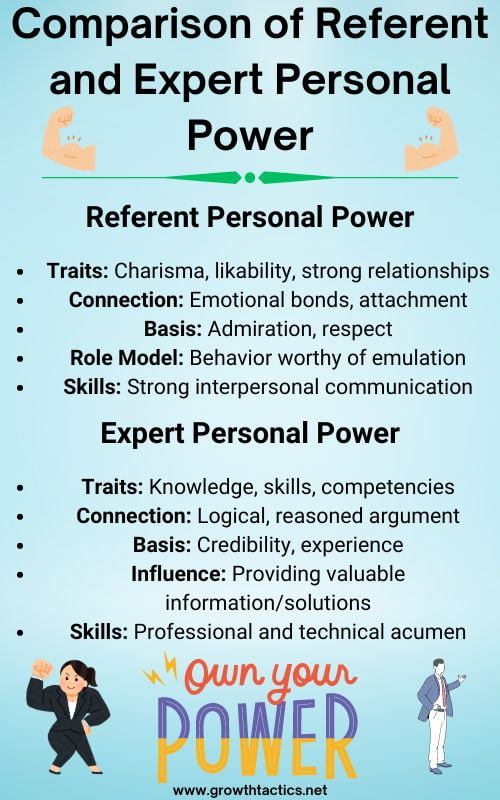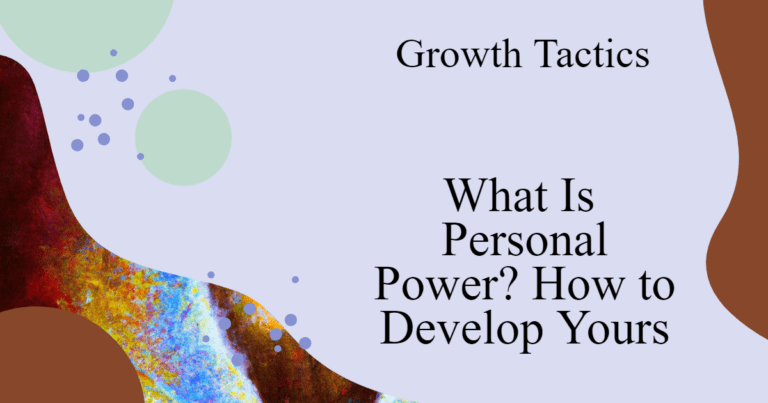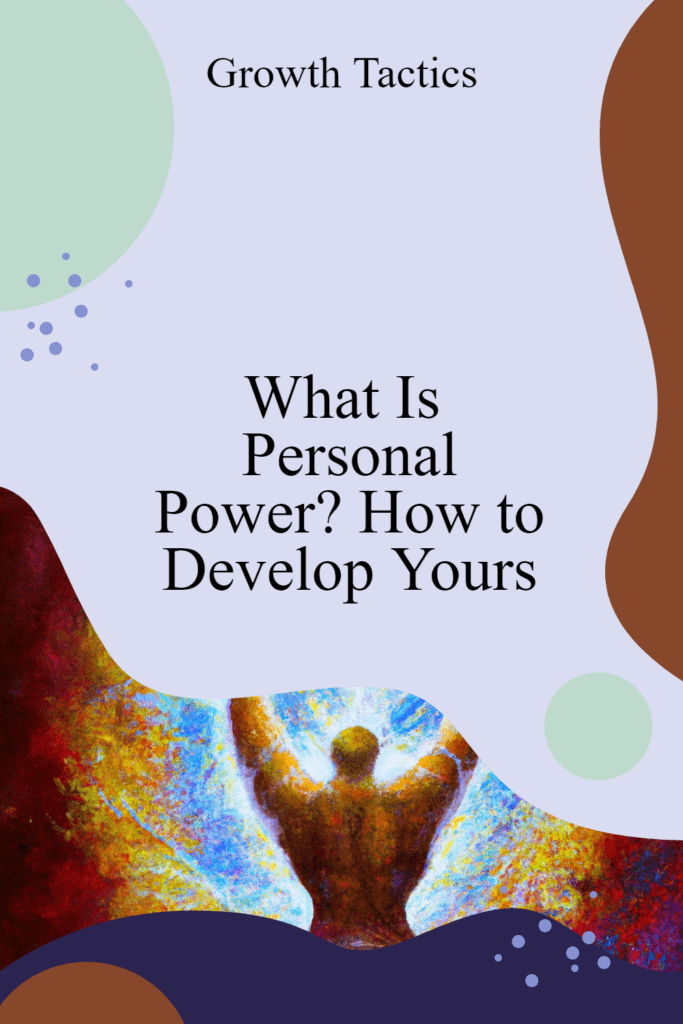Do you want to be a better leader in business and life?
Wouldn’t it be nice if people listened to you more and didn’t question you so much?
The answer may be personal power. Personal power is crucial for achieving success and fulfillment in both personal and professional realms.
Jump To Section
What is Personal Power?
Personal power is the ability to influence people and events. It is based on individual characteristics rather than formal authority and is more of an attitude or state of mind than an attempt to maneuver or control others. It is based on competence, vision, positive personal qualities, and service.
To develop personal power, one must recognize their ability to influence the behavior of others, have self-awareness, confidence, and the ability to draw others in with their charisma or wisdom.
Additionally, one must own their power, stand up for themselves, negotiate for themselves, demonstrate their value, and take risks.
Real-World Examples of Personal Power
- Influential Leaders Without Formal Authority:
- Mahatma Gandhi: Gandhi’s personal power derived from his vision of a free and independent India, his commitment to non-violent resistance, and his ability to inspire millions despite having no formal authority.
- Greta Thunberg: As a young climate activist, Thunberg has no formal political power, but she has influenced global leaders and raised awareness about climate change through her honesty, dedication, and ability to mobilize people.
- Effective Managers and Supervisors:
- A Charismatic Team Leader: In an office setting, a team leader who does not hold formal managerial authority can still exercise personal power. They do this through their expertise, their ability to motivate colleagues, and their knack for problem-solving.
- A Mentor in the Workplace: A seasoned employee who provides guidance and support to newer employees, helping them to navigate challenges, thus wielding influence through experience and mentorship.
- Community Organizers and Activists:
- Local Community Advocates: Individuals who rally their neighborhoods to tackle local issues, such as improving safety or creating community gardens. They exhibit personal power through their dedication, networking skills, and the ability to galvanize others around a common cause.
- Educators and Coaches:
- Inspirational Teachers: A teacher who impacts their students’ lives beyond academics by mentoring them, encouraging critical thinking, and fostering a love for learning, despite having just a classroom setting for influence.
- Sports Coaches: Coaches who inspire their teams to success not just through commanding authority but through demonstrating passion, commitment, and personal excellence.
Types of Personal Power
There are two main types of personal power: referent power and expert power. Referent power is characterized by strong interpersonal skills, such as charisma and approachability, which can put others at ease and inspire commitment.
Expert power is based on strength, confidence, and competence that individuals gradually acquire in the course of their lives. It is also associated with having self-awareness, confidence, and the ability to draw others in with charisma or wisdom.

The Difference Between Personal and Positional Power
Positional power is the authority and influence a person has due to their position in an organization or hierarchy. It is based on the title or rank of the individual and is typically seen with a negative connotation.
On the other hand, personal power is the influence a person has due to their personal qualities, skills, and reputation. It is based on the individual’s character and how they are perceived by others and is typically seen as a positive connotation.
Positional power is given to an individual by an external authority, and can easily be taken away.
Personal power, however, takes time and effort to develop and is based on the individual’s name and reputation. It is also more permanent, as it is based on the individual’s character and virtue.
Positional power is typically used to influence behaviors, while personal power is used to lead others. Those with personal power are grounded in their values and are usually in service of something greater than themselves.
Can You Increase Your Personal Power?
Yes, you can increase your personal power by developing certain qualities, skills, and behaviors. Here are some ways to increase your personal power:
Develop Strong Self-Awareness
Developing self-awareness is a crucial step in increasing personal power. Here are some ways to develop self-awareness:
- Reflect on your values: Think about the values that are important to you and how they guide your decisions and actions. Consider how your values align with your personal and professional goals.
- Identify your strengths and weaknesses: Be honest with yourself about your strengths and weaknesses. Identify areas where you excel and where you need improvement.
- Seek feedback: Ask trusted friends, family members, or colleagues for feedback on your strengths and weaknesses. Be open to constructive criticism and use it as an opportunity to grow.
- Keep a journal: Writing down your thoughts and feelings in a journal can help you gain insight into your thoughts, emotions, and behaviors. Regularly reviewing your journal can help you identify patterns and areas of improvement.
- Practice mindfulness: Mindfulness is the practice of being present and aware of your thoughts, feelings, and surroundings. Practicing mindfulness can help you develop self-awareness and improve your ability to manage your emotions and reactions.
- Take personality assessments: Personality assessments, such as the Myers-Briggs Type Indicator or the Big Five Personality Traits, can provide insight into your personality traits, preferences, and behaviors. Use this information to better understand yourself and your interactions with others.
By developing self-awareness, you can better understand your strengths and weaknesses, align your actions with your values, and become a more effective leader and influencer.
Build More Expertise
Building expertise is another important way to increase personal power. Here are some ways to build your expertise:
- Continuously learn and improve: Stay up-to-date with the latest trends and developments in your industry or field. Read industry publications, attend conferences and seminars, and take courses to develop new skills or deepen your knowledge.
- Seek out mentors: Find mentors who can provide guidance and advice on developing your expertise. Look for people who have achieved success in your field or have expertise in areas where you want to improve.
- Practice your skills: Practice your skills regularly to improve your proficiency. Look for opportunities to apply your skills in real-world situations, such as volunteering or taking on new projects at work.
- Build a network: Build relationships with people in your industry or field. Attend networking events, join professional organizations, and connect with people on social media platforms like LinkedIn.
- Share your knowledge: Share your expertise with others by writing articles, giving presentations, or teaching others. This not only helps to establish your credibility as an expert, but it also provides opportunities for you to learn from others.
- Embrace new technologies: Keep up with new technologies and tools that can help you work more efficiently and effectively. Be willing to try new things and experiment with new technologies.
By building your expertise, you can establish yourself as a thought leader in your industry or field and gain the confidence and respect of others. This can help increase your personal power and influence.
Master The Art of Communication
Mastering communication is an essential aspect of increasing personal power. Here are some ways to master communication:
- Develop active listening skills: Effective communication starts with listening. Practice active listening by paying attention to what the other person is saying, asking clarifying questions, and providing feedback to show that you understand.
- Improve your speaking skills: Work on speaking clearly, confidently, and concisely. Practice speaking in front of others, record yourself speaking, and get feedback from others on how you can improve.
- Use nonverbal communication: Nonverbal communication, such as body language and facial expressions, can convey a lot of information. Be aware of your nonverbal cues and the cues of others to better understand their messages.
- Adapt your communication style: Adapt your communication style to the person or audience you are speaking with. Consider their communication preferences, cultural background, and personality.
- Build rapport: Building rapport with others can help establish trust and increase the effectiveness of your communication. Look for common ground, show interest in the other person, and use positive body language to build rapport.
- Practice assertiveness: Assertiveness is the ability to express your thoughts, feelings, and needs clearly and respectfully. Practice being assertive by using “I” statements, being clear about your expectations, and setting boundaries.
By mastering communication, you can better connect with others, convey your ideas and goals effectively, and increase your influence and personal power.
Build Strong Relationships With Others
Building strong relationships is another important way to increase personal power. Here are some ways to build strong relationships:
- Build trust: Trust is the foundation of any strong relationship. Be honest, reliable, and consistent in your interactions with others. Follow through on commitments, admit mistakes, and show empathy.
- Show appreciation: Show appreciation for others by expressing gratitude, recognizing their contributions, and providing positive feedback. This can help build a sense of mutual respect and support.
- Be a good listener: Listening is an important part of building strong relationships. Practice active listening by giving your full attention, asking clarifying questions, and providing feedback to show that you understand.
- Keep communication open: Keep communication open and frequent, even when there are disagreements or conflicts. Be willing to have difficult conversations and work together to find solutions.
- Support others: Support others by offering your assistance, sharing resources, and providing feedback. This can help build a sense of collaboration and teamwork.
- Build a diverse network: Build a diverse network of relationships that includes people from different backgrounds, industries, and perspectives. This can help broaden your perspective and increase your exposure to new ideas and opportunities.
By building strong relationships, you can increase your personal power by leveraging the support and resources of others, building a strong reputation, and increasing your influence and reach.
Set Proper Boundaries
Setting boundaries is an essential aspect of increasing personal power. Here are some ways to set boundaries:
- Identify your values and priorities: Identify what’s important to you and use this as a guide for setting boundaries. Consider your values, goals, and priorities when making decisions about what you will and won’t accept in your life.
- Be clear and direct: Be clear and direct when setting boundaries. Clearly state what you will and won’t accept and be specific about consequences if those boundaries are crossed.
- Practice saying “no”: Saying “no” is an important part of setting boundaries. Practice saying “no” respectfully and assertively. You don’t have to explain your reasons for saying “no” but you can offer a brief explanation if you feel it’s necessary.
- Protect your time and energy: Protect your time and energy by setting boundaries around how you spend your time and who you spend it with. This can include setting limits on work hours, saying “no” to social obligations, and taking regular breaks to recharge.
- Learn to delegate: Delegating tasks and responsibilities can help you set boundaries around what you can realistically manage. Identify tasks that can be delegated and empower others to take on those responsibilities.
- Be flexible: Be flexible when setting boundaries. Consider the needs and perspectives of others and be willing to adjust your boundaries as needed.
By setting boundaries, you can increase your personal power by protecting your time, energy, and resources, creating a sense of self-respect, and increasing your self-confidence and assertiveness.
Always Maintain Integrity
Maintaining integrity is critical for increasing personal power. Here are some ways to maintain integrity:
- Be honest: Honesty is an essential aspect of integrity. Be truthful in your interactions with others, even when it’s difficult.
- Keep your promises: Keeping your promises is crucial for maintaining integrity. Follow through on commitments and be accountable for your actions.
- Admit mistakes: Admitting mistakes is a sign of strength and honesty. When you make a mistake, take responsibility for it, and work to make things right.
- Treat others with respect: Treating others with respect is an essential part of maintaining integrity. Show empathy, kindness, and consideration for others, even when you disagree with them.
- Be consistent: Consistency is a key element of integrity. Act in a way that is consistent with your values and principles, even when it’s challenging.
- Be transparent: Transparency helps build trust and maintain integrity. Be open and honest about your actions, decisions, and intentions.
By maintaining integrity, you can increase your personal power by building trust, establishing a strong reputation, and demonstrating your values and principles to others. This can help you build meaningful relationships, earn respect, and achieve your goals with integrity and authenticity.
Staying Humble is Crucial
Staying humble is a vital characteristic for increasing personal power. Here are some ways to stay humble:
- Recognize your limitations: Everyone has limitations, and it’s essential to recognize and acknowledge them. Be honest with yourself about your strengths and weaknesses.
- Practice gratitude: Gratitude helps keep us grounded and focused on what matters. Take time to appreciate the people and things in your life that bring you joy and fulfillment.
- Listen to others: Listening to others is an essential aspect of staying humble. Be open to feedback and different perspectives, and be willing to learn from others.
- Acknowledge others’ contributions: Recognize and acknowledge the contributions of others. Be generous with compliments and express gratitude for the efforts of those around you.
- Focus on personal growth: Focusing on personal growth helps us stay humble by acknowledging that there is always room for improvement. Continuously seek opportunities for learning and development.
- Avoid arrogance: Arrogance is the opposite of humility and can quickly erode personal power. Avoid bragging or boasting about your accomplishments and be careful not to take credit for the work of others.
By staying humble, you can increase your personal power by earning the trust and respect of others, building strong relationships, and demonstrating your willingness to learn and grow. This can lead to greater opportunities for success and fulfillment in both personal and professional life.
Take Accountability for Your Life
Being accountable is a critical aspect of increasing personal power. Here are some ways to be accountable:
- Take responsibility for your actions: Taking responsibility for your actions is an essential part of accountability. Acknowledge when you make a mistake, and take steps to make things right.
- Set clear goals: Setting clear goals helps you stay focused and accountable. Write down your goals, and make a plan to achieve them.
- Keep track of progress: Keeping track of your progress helps you stay accountable by providing a clear picture of your accomplishments and areas for improvement.
- Seek feedback: Seeking feedback from others is an essential part of accountability. Listen to constructive criticism, and be willing to make changes based on feedback.
- Be reliable: Being reliable means following through on commitments and doing what you say.
- Learn from mistakes: Learning from mistakes is an essential part of accountability. When you make a mistake, reflect on what went wrong and make changes to prevent it from happening again.
By being accountable, you can increase your personal power by demonstrating your reliability and trustworthiness. This can lead to greater opportunities for success, respect, and influence in both personal and professional life.
Did you enjoy this article on personal power? Please share and subscribe below.


